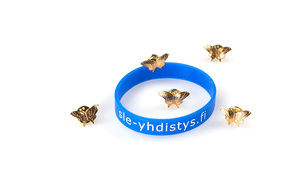My Lupus story doesn’t start in 1993 with an SLE diagnosis, but eight years earlier in 1985, when at the age of 22 I got pneumonia for the first time. O spent two weeks in hospital with a horde of doctors around my bed wondering why antibiotics weren’t working. The oldest doctor mentioned that I may have a condition called LED (an old name for Lupus, still used by some doctors in Finland). At the time, it obviously didn’t mean anything to me, I didn’t look it up in a library, but it re mained in my memory. Luckily, the antibiotics worked shortly after and I went home to recover.
mained in my memory. Luckily, the antibiotics worked shortly after and I went home to recover.
The following year I was accepted to university to study English Philology, the history of language and culture and linguistics. My first one and a half years as a student were bliss, but then everything changed. I had pneumonia every other year and repeated bouts of bronchitis in between. That made me skip many courses but I was able to finish them later, when I felt better. In January 1993, I was in a middle of my teacher training when a persistent temperature took me to a university hospital for a couple of weeks, where I was diagnosed with Lupus.
Lupus explained the many symptoms I had been having on top of my lung problems. I had achy swollen joints, sun sensitivity, leukopenia, anaemia and red patches on my arms and legs. It was most active for 10 years, during which time I also had pericarditis twice and myocarditis once. Twice, a sudden rise of temperature where I developed pneumonia in a couple of hours and was taken to hospital in an ambulance.
Despite Lupus I had a child in 1995. Thanks to specialised neonatal care, I was able to give a normal birth to a healthy girl, who is now 21 years old. She has had no symptoms, for which I am very grateful.
Looking back now on the active period, the medication seems to have worked and I slowly recovered. I took cortisone for ten years, azathioprine and methotrexate for a while. The latter two didn’t suit me, but I think they did their job anyway, because my Lupus went into remission 12 years ago. In 2004 I was able to stop taking cortisone and my Lupus has remained dormant ever since. I took hydroxychloroquine during the ten active years too, but then stopped taking it. In 2012 I felt my Lupus may be becoming active again and started taking hydroxychloroquine once more. It may have helped and stopped an active disease flare up, who knows?
Although Lupus has been a pain in the butt and has created obstacles in my life and made life a bit more challenging, I have been able to do all I have dreamt of. I finished my studies in the end and took out both BA and MA degrees in English Philology, philosophy and teacher training. I worked for 16 years altogether as an English teacher, then I retrained in accounting and still have a job as an accountant. Another dream that worked out well was to have a child, and that happened too. She is the light of my life.
It seems I was one of the unlucky ones to get Lupus, but having said that, I also feel very lucky that my Lupus is dormant right now. No-one knows how it will go in the end and my Lupus may become active again, but I don’t want to think about that and so I live life one day at a time, doing things that interest me most. Lupus has taught me to be happy about simple things. Lupus has also introduced me to wonderful people around the world that I most probably would never have met. As I see it, having a chronic illness makes one enjoy and respect the good days and make the most of one’s life.
Kikka is a member of Lupus Finland –  SLE-yhdistys ry
SLE-yhdistys ry




